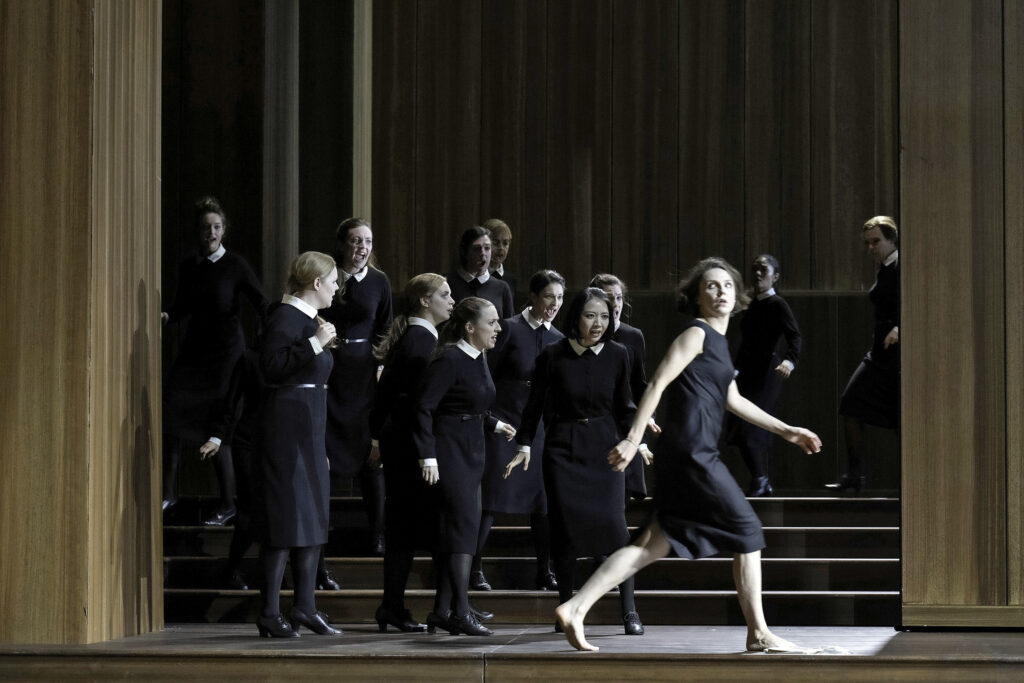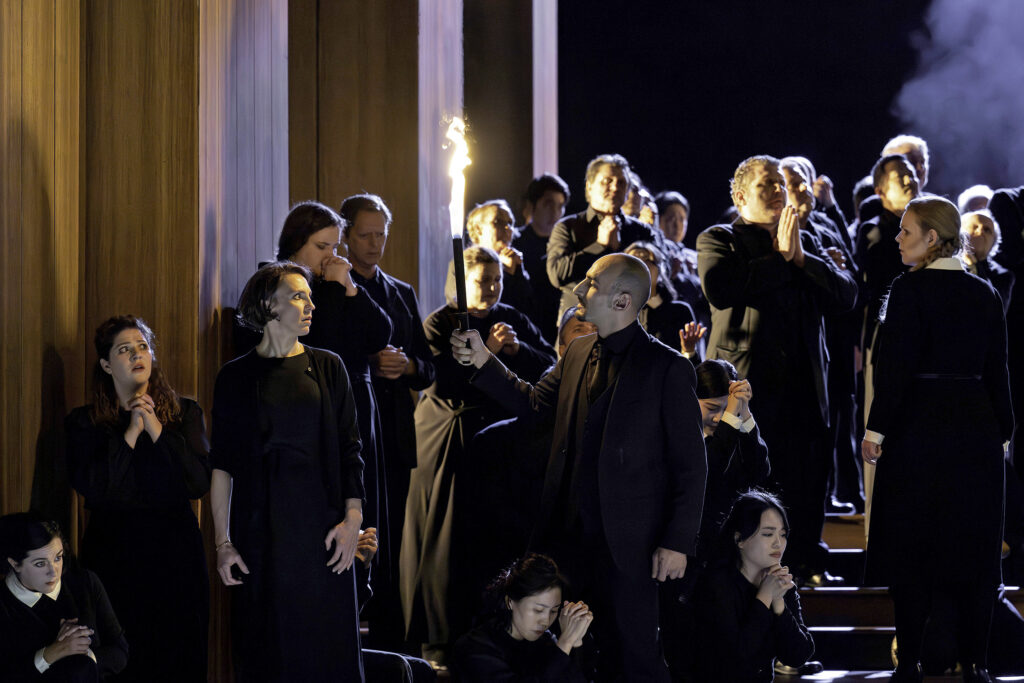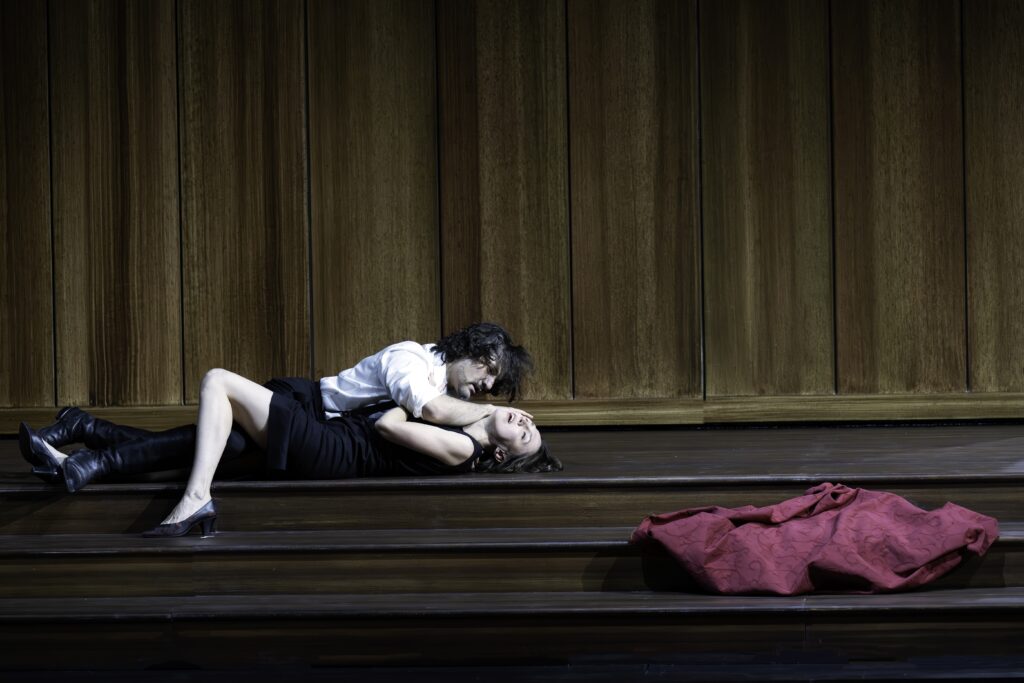Bourgeois psychodrama from ancient Byzantium: Christof Loy stages Ottorino Respighi’s exaggerated opera plot of ‘La Fiamma’ at the Deutsche Oper Berlin as if it were a Pasolini film.
Christof Loy is one of a kind: with him, even a story about the burning of witches in Ravenna in the 7th century looks like a play by Ibsen, filmed by Pasolini. Nobody can stage the betrayed zest for life in a little black dress, barefoot, between candelabras and red wine glasses on the steps, as he does with Silvana, the young wife of the old exarch in Ottorino Respighi’s monumental opera ‘La Fiamma’ at the Deutsche Oper Berlin. This breathes dissatisfaction and erotic readiness and tells in a single image, a single pose, the whole story of woe of a woman who, still a minor, was set up by her own mother with the ruler and was never happy for a moment in this relationship.

She immediately falls for her returning stepson Donello, a young but already mature lad with curly hair, who also gets it on with the first maid and easily switches to the barely older stepmother. A kind of Eros on the march, who will still pick many other flowers and therefore clearly admits in the final showdown that she is not his last love.
For Silvana, this is a death sentence: all her love is now broken, and when she has to swear that it is not the flame of witchcraft that burns in her, but (only) that of sinful, adulterous love, her voice fails and her life is destroyed. The curtain falls; the pyre no longer needs to be shown.

Of course, Herbert Murauer‘s stage also contributes to the contemporary impression of the production. These staircases stretch across the entire width of the stage and lead up to a kind of diorama that can be transformed to show a thicket of plants, the light of the witch burning at the beginning, gathering clouds and, when needed, closed with sliding wooden walls. But one is never completely intimate in this house of power; Loy has always scattered a few servants into the picture, has security lurking in the background as if it were none of their business. But even in this dignified ambience, everything is an eye and an ear.
Especially since there is the power-conscious Mamma Eudossia, who, in the ultimately correct assumption that the young woman is not for her mature son, does everything she can to fulfil this prophecy. In doing so, she only serves to bring about the misfortune of her son, who probably does love his young wife in his own way and collapses dead when she, in a final act of self-empowerment, throws the truth in his face and also challenges the adultery with Donello.
It is great how Loy is able to create this intimate play atmosphere in the much too large rooms of power through concise character direction. And his singers give film-worthy performances. Respighi’s music admittedly does not have the qualities of harmonically daring, intimate psychological detail that characterises Wagner. He prefers the thick orchestral tassel, the wide-screen brush, sometimes a large choral tableau, the often brute volume, which conductor Carlo Rizzi also uses magnificently. And when he does turn down the volume, he likes to follow the formal structures of early music, which all sounds very nice, but doesn’t really get to the bottom of the complicated emotional states of the characters.
Thus, the love duet when Silvana Donello seduces, with harp and delicate strings, takes on an innocence it doesn’t have, because she is here, with all her passion, reaching for forbidden fruit. In terms of content, we are closer to Tristan and Isolde than to Romeo and Juliet. Then her voice is almost hysterical as she settles accounts with her husband, only then does the orchestra rise to a thick pendulum rhythm, to which the exarch’s fatally wounded heart falls victim to dissonant orchestral beats.
Ivan Inverardi portrays the role of the lovable monster with a powerful baritone full of touching beauty. Georgy Vasiliev sings the role of the carefree lover Donello with a solid tenor voice. Martina Serafin‘s characterisation of the evil grandmother Eudossia is interesting, with many unfathomable depths in her soprano. Right at the beginning, Doris Soffel gives a passionate performance as Agnese di Cervia, who was persecuted as a witch, and sets a cautionary example for Silvana’s later problems. Of course, Loy does not show her as a witch, but as a non-conformist woman whose courage fades in the face of the angry masses.

Subsequently, Silvana will know how to win the masses under similar persecution, but when Donello no longer stands by her, it is all meaningless. She does not finish the oath, breaking out into laughter: after an unloved husband and a faithless lover, she resigns herself to the fate of a witch. Olesya Golovneva is a petite and attractive representative of the role, endowed with a seemingly tireless and always dramatically soaring soprano voice. Her tone is loud, somewhat unfocussed, but of absolute power and burning with commitment in all registers. And this last laugh goes right through you.
Thanks to Loy’s direction, the medieval material, which Respighi brought forward from the Reformation period to the Byzantine Ravenna of the 7th century and thus exoticised, allows us to see a psychological-erotic explosiveness. As part of the consistent research into the early 20th century at the Deutsche Oper Berlin, ‘La Fiamma’ brings an interesting colour into the picture, but it is certainly not a discovery for the repertoire.